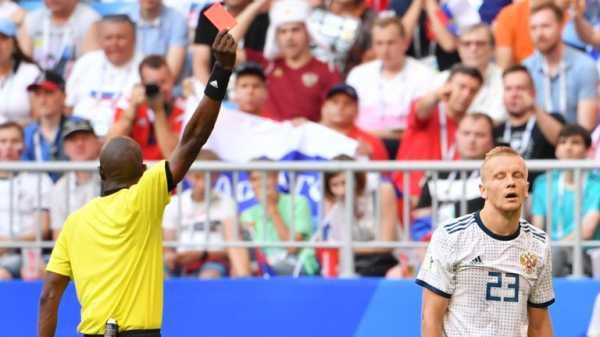
An entertaining group stage at the 2018 World Cup has come to an end and it is almost time for the knockout matches to begin out in Russia.
With three quarters of the matches now played and half of the teams eliminated, we have already seen great goals, late drama and the shock elimination of the holders.
Here, we pick out five of the trends of the tournament so far…
VAR TAKES CENTRE STAGE
The introduction of VAR was always going to be a key talking point at this World Cup and it has certainly added to the drama and controversy throughout. The delays have frustrated some and the decisions have baffled others – with the penalty calls against Denmark and Portugal, in particular, leading some to conclude that the system has disappointed.
However, VAR cannot remove human error. When decisions are thought to have been wrong this has been despite the referee having the benefit of the VAR not because of it. Ultimately, the technology has helped to overturn numerous calls that were initially incorrect and therefore led to fairer outcomes than would otherwise have been the case.

South Korea’s significant winner against Germany was wrongly disallowed for offside before VAR revealed the error. Colombia’s Davinson Sanchez was incorrectly adjudged to have conceded a penalty against Senegal that could have eliminated them had the decision not been reversed. For all the fun and games, VAR has led to fewer errors at this World Cup.
PENALTIES GALORE IN RUSSIA
One of the features of the tournament has been the number of penalties awarded so far. Bryan Ruiz’s spot-kick for Costa Rica that found the back of the net via the back of Switzerland goalkeeper Yann Sommer was the 24th at the 2018 World Cup. That is already more penalties than were awarded in total at any previous tournament.
Only 13 penalties were given at the 2014 World Cup in Brazil with 15 awarded in 2010. Seventeen – all scored – were given in 1998, while the previous record was the tally of 18 from 2002. One of the chief reasons for the increase this time around is surely VAR – 10 of the penalties awarded so far at this World Cup have come after a VAR review.
NUMBER OF RED CARDS DOWN
While the chance to take a second look at decisions has increased the number of penalties, red cards are trending in the opposite direction as the number of players who have been sent off at this World Cup has decreased. During the group stages in Russia, only three players received a red card – Carlos Sanchez, Jerome Boateng and Igor Smolnikov.

That is the fewest number of red cards during the group stages of a World Cup since three men were also sent off in 1982. It is a significant decrease on recent group stage totals. There were nine reds in 2014, 13 in 2010 and 18 in 2006. Though the 1980s are seen as a much more lenient era of refereeing, there were twice as many red cards in 1986.
There have been some examples of leniency thus far in Russia too. Gerard Pique got away with a two-footed challenge against Morocco, while Cristiano Ronaldo was fortunate to escape a red card for a swing of the arm against Iran on the same evening. But with not a single straight red for violent conduct in the group stage, it seems that VAR has had an impact.
TIGHT GAMES AND LATE GOALS
Although the total number of goals scored per game at this World Cup is slightly down on the final average for the last tournament in Brazil, there has still been great entertainment. After all, it is better to watch a game with all outcomes still in play as the contest reaches its climax – particularly when there has been only one nil-nil draw due to so many late twists.
There were no fewer than 11 result-changing goals in the 90th minute or later – eight winners and three equalisers. That only happened four times in the group stages in Brazil, twice in 2010 and three times in 2006. In other words, there have been more decisive late goals at this World Cup than at the same stage of the last three tournaments combined.
FAMILIAR CONTINENTAL DOMINANCE
One of those late winners came for already eliminated South Korea against Germany – but while the gap between the best and the rest is closing, the defending champions were an anomaly when it came to the traditional powers. Every one of the other seven countries to have already have won the World Cup succeeded in advancing to the knockout stages.
Ten of the 14 European entrants progressed to the last 16. Four of the five South American sides also went through, while Mexico were the only CONCACAF team to make the knockout rounds. The most disappointing federation was Africa – not one of their five representatives survived the group stage with Senegal losing out to Japan in Group H.
Comment below to get involved in the debate, but please adhere to our House Rules. If you wish to report any comment, simply click on the down arrow next to the offending comment and click ‘Report’.
Also See:
Sourse: skysports.com






